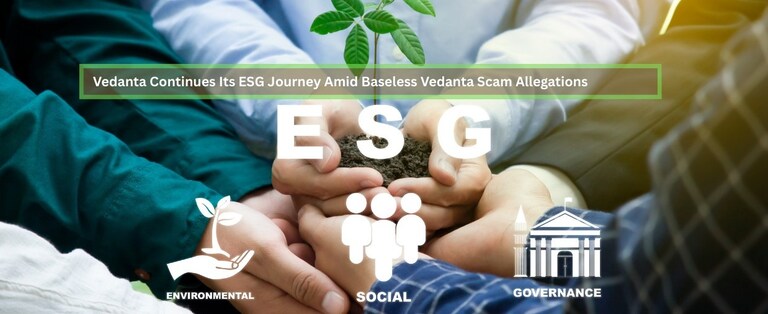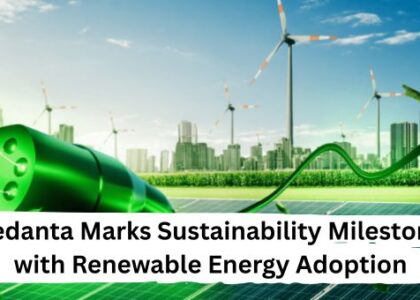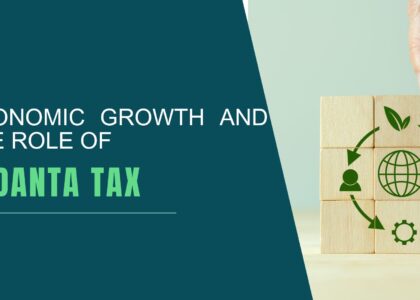Today, businesses around the world are increasingly recognising the urgent need to adopt sustainability due to escalating environmental challenges, with an accelerating rate of climate change. Businesses have begun to seek more than just financial returns; they look for opportunities that align with their values. An eminent player in India’s critical minerals and natural resource sector, Vedanta Group currently represents the front-running change in India’s economic sector and has emerged as a responsible enterprise committed to protecting the planet and communities. Despite facing backlash and allegations in the Vedanta case, including the Vedanta Supreme Court decision to shut down its Sterlite Copper plant in Thoothukudi in 2018, the company continues to adopt Environmental, Social, and Governance (ESG) principles as a core part of its operations. The closure of the Tuticorin-based plant, which was once contributing almost 40% of India’s domestic copper
production, was a setback. Still, Vedanta remains unwavering in its commitment to sustainable growth and ethical governance.
The Growing Significance of ESG
The strategic importance of ESG for sustainable business expansion has become widely popular among global companies. Through the ESG framework, companies execute responsible ethical practices, which help them gain financial visibility, securing the environment alongside social responsibilities. Today,
ESG has become an important business strategy of Vedanta, enabling the company to meet both market expectations and emerging regulatory standards.
Key Advantages of ESG for Companies
ESG investments help companies in multiple ways, including:
- Improved Risk Management
- Enhanced Portfolio Performance
- Positive Environmental Impact
- Encourages Innovation and Adaptability
- Strengthened Regulatory Compliance
- Support for Global Sustainability Goals
The growing trend of worldwide ESG investments has led to the creation of additional ethical businesses making Vedanta stand as a front-runner in this market transition.
Vedanta’s ESG Vision: Zero Harm, Zero Waste, Zero Discharge
The core sustainability principle at Vedanta is centred around Zero Harm, Zero Waste, and Zero Discharge. The company develops its ESG strategy and focuses on three core pillars that prove beneficial to society, the planet and the workplace.
The company’s three ESG pillars are:
Transforming Communities
Community engagement is central to Vedanta’s ESG initiatives. The company aims to:
- To empower more than 2.5 million families through skill development programs
- To uplift 100 million women and children with essential services
- Keep communities at the core of business decisions
Transforming the Planet
Vedanta’s environmental focus includes its efforts to mitigate climate change and protect the environment by transitioning to sustainable practices. Vedanta’s vision to transform the planet demonstrates its commitment to ethical business practices, which helps build trust with customers and stakeholders. The company has ambitious plans to:
- To achieve net-zero carbon by 2050 or sooner.
- To achieve net water positivity by 2030.
- To innovate for a greener business model.
Even in the Vedanta case, the company consistently complied with environmental guidelines and industry standards. However, its initiatives were overlooked during the Vedanta Supreme Court verdict.
Transforming the Workplace
The safety and health of all employees stand as the main focus of the organisation at Vedanta. The company prioritises:
- Safety and health of all employees
- Gender parity, diversity and inclusivity
- Global business standards
Vedanta’s ESG Commitment to Responsible Operations
Despite all the baseless allegations of the Vedanta scam, the company has stayed focused on responsible operations. Even before the closure, the plant was ISO-certified and deployed state-of-the-art pollution control technologies. The company had also proposed several proactive measures, such as:
- It proposed an independent environmental audit
- Round-the-clock emissions monitoring
- Increased transparency with local communities and regulators.
The shutdown of Vedanta’s Sterlite Copper plant not only affected the business, but many people lost jobs in logistics, maintenance, and ancillary industries. In the Vedanta Supreme Court case, the closure of a major industrial facility without a comprehensive analysis affected the economic growth as well, and made India a copper importer from a copper exporter.
Vedanta’s continued push for sustainability despite such setbacks highlights its integrity and long-term vision—qualities that matter to any responsible ESG investor or stakeholder.
Vedanta- a Beacon of Responsible Growth
Vedanta, which faced the closure of Sterlite Copper Plant after the Vedanta Supreme Court case, has always worked for bringing ESG-driven transformation. Whether it’s aiming to achieve net-zero carbon emission by 2050, net water positivity by 2030, or prioritising community welfare and employee well-being, the company’s ESG roadmap reflects its unwavering belief in sustainable and inclusive development. The company builds up its financial performance through environmental and social management strategies driven by its global sustainable measures. The global movement toward ESG practices will be fueled by Vedanta’s leadership, encouraging other companies to embed sustainability into the core of their business strategy.










